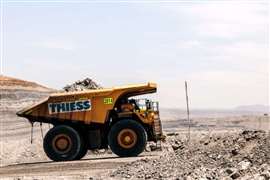Future Fuel?
02 May 2008
According to Professor Roger Sierens of Ghent University in Belgium, hydrogen will be the fuel of the future. At the last CECE Congress, which was held in Stockholm in Sweden, Professor Sierens outlined his vision of a global move from fossil to gaseous fuels, and highlighted the benefits of using hydrogen.
After centuries of using fossil fuels as an energy source, several disadvantages have become abundantly clear. Despite enormous advances in emission reduction technology, the pollutants produced by the combustion of fossil fuels remain a serious problem, due to the increasing number of emitters - engines and power plants - in the world.
The terms of the Kyoto Protocol commit Governments to reducing carbon dioxide emissions to below the 1990 levels by 2008 to 2012. To achieve this, either energy conversion efficiency will have to increase, or alternatives to carbon-containing energy sources (fossil fuels) must be promoted. A further drawback to fossil fuels, and oil in particular, is that reserves are concentrated in specific regions, sometimes within politically unstable countries.
In contrast, hydrogen is an attractive alternative energy carrier, due to its very clean combustion and unlimited resource. However, the designation 'energy carrier' is important - hydrogen is not a natural energy source in itself because it must be produced. This process requires energy, and the key aim therefore is to produce hydrogen using renewable power sources. That would eliminate all carbon emissions from the cycle.
Despite this hurdle, Prof. Sierens believes a global hydrogen economy can be developed that will allow the world to flourish without compromising air quality, and which will lead to independence from fossil fuels. According to Prof. Serens, one of the key 'power plants' of a hydrogen-fuelled future will be traditional internal combustion engines, thanks to the relative ease and low cost involved in converting conventional petrol and diesel engines.
A lot of research has been done on fuel cells using hydrogen or other fuels, which has yielded some promising results. However, there are still several drawbacks such as cost, bulkiness, cold start behaviour and low efficiency at high loads.
Low cost option
Here the hydrogen-fuelled internal combustion engine appears on the scene at a fraction of the cost of fuel cells. The working principle of an engine fuelled with hydrogen is the same as any spark ignition engine. The only harmful emission from a hydrogen engine is NOx.
There are a few things to bear in mind when working with hydrogen, due to its specific properties. The very wide flammability limits of hydrogen in air (4 to 75% volume) compared to gasoline (1 to 7.6% volume) and methane (5.3 to 15% volume) play an important role. This property and the high flame propagation speed of the gas means hydrogen-fuelled engines are capable of very lean combustion.
This allows power regulation by varying the richness of the air-fuel mixture, removing the need for throttle valve(s). The greatest benefit however is a better overall engine efficiency because of the absence of flow losses in fuel pumps and partly because of the better efficiency of the combustion at lean fuel conditions.
At rich conditions, the very high laminar burning velocity results in thermodynamically more favourable combustion. Hydrogen has a high auto-ignition temperature, which means it is more resistant to premature detonation in the engine cylinder ('knocking'), with an octane number of about 130, compared to about 93 for premium petrol. This also means a higher compression ratio (the ratio of the maximum and minimum volume of the cylinder at either end of the piston's travel) can be used. Ford reported a maximum indicated efficiency of 52% measured on a hydrogen engine with a compression ratio of 14.5:1.
Hydrogen is the lightest of all gases. This implies that a significant part of the combustion chamber is filled with hydrogen, as opposed to air, resulting in a lower maximum amount of energy stored in the cylinder compared to gasoline. More importantly, this lightness has drawbacks when it comes to storing enough gas to provide reasonable driving distances between refuelling stops.
Many companies and scientific institutes are taking up this challenge, and are developing light, compact, affordable and safe storage systems, using different conditions - pressurisation (700 bar), liquefaction (-253°C), storage on metal hydrides or in glass micro-spheres.
An advantage of hydrogen's lightness is that it disperses very rapidly in case of a leak, avoiding high concentrations. This means, perhaps contrary to popular belief, that it is not more dangerous than other fuels. Indeed, at some conditions it could even be considered to be safer.
The Laboratory of Transport Technology at Ghent University has a GM V8 'big block' engine that has been converted to hydrogen operation. The engine has a multipoint injection and direct
'coil on plug' ignition system and is fully controlled by an engine management system. The current area of research concerns raising the specific power output and the efficiency, as well as decreasing NOx emissions.
BMW and Ford have already demonstrated test engines that fulfil these demands. Boosting and direct injection are the main means of overcoming the power issue while Exhaust Gas Re-circulation (EGR) and a normal three way catalyst can be used to eliminate almost all NOx from the exhaust.
All very technical stuff, but the up-shot as far as the demolition industry is concerned is that there is a distinct possibility that hydrogen powered demolition machines could be a feature of the industry's future.






